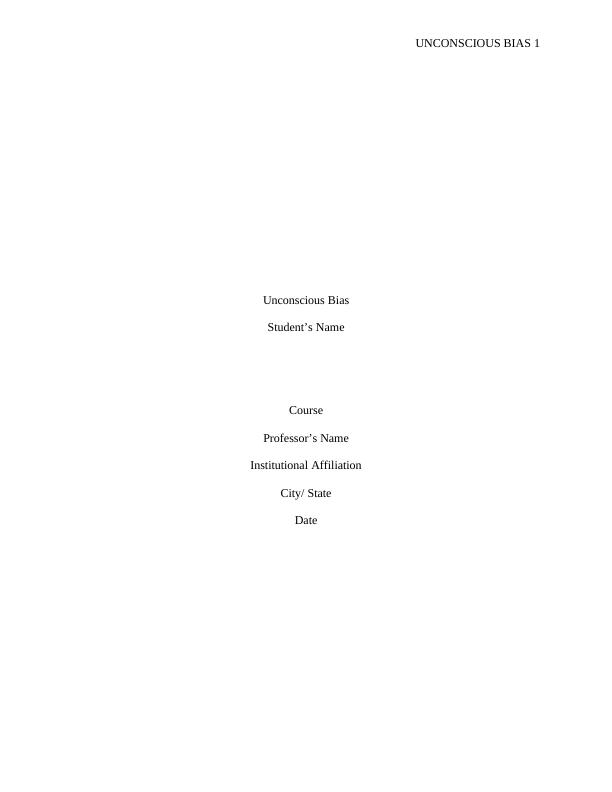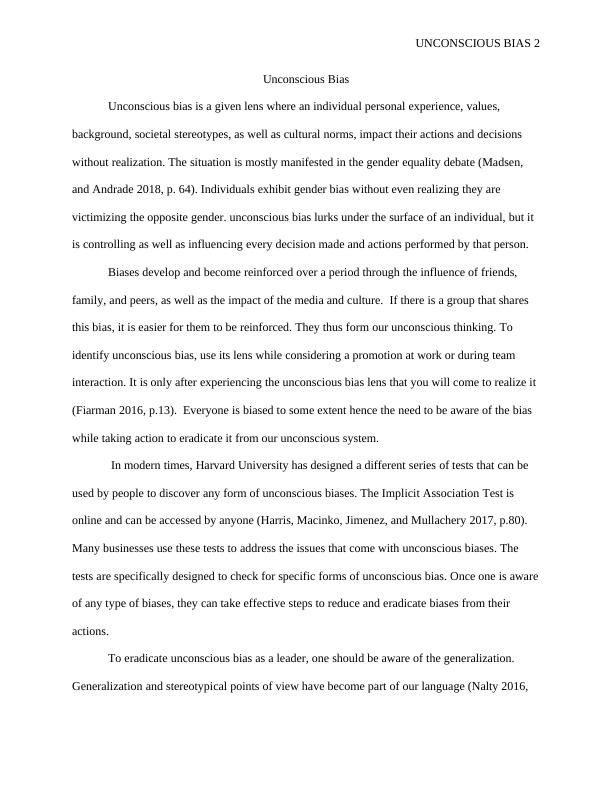Where an individual personal experience
Added on 2022-10-09
4 Pages718 Words50 Views
UNCONSCIOUS BIAS 1
Unconscious Bias
Student’s Name
Course
Professor’s Name
Institutional Affiliation
City/ State
Date
Unconscious Bias
Student’s Name
Course
Professor’s Name
Institutional Affiliation
City/ State
Date

UNCONSCIOUS BIAS 2
Unconscious Bias
Unconscious bias is a given lens where an individual personal experience, values,
background, societal stereotypes, as well as cultural norms, impact their actions and decisions
without realization. The situation is mostly manifested in the gender equality debate (Madsen,
and Andrade 2018, p. 64). Individuals exhibit gender bias without even realizing they are
victimizing the opposite gender. unconscious bias lurks under the surface of an individual, but it
is controlling as well as influencing every decision made and actions performed by that person.
Biases develop and become reinforced over a period through the influence of friends,
family, and peers, as well as the impact of the media and culture. If there is a group that shares
this bias, it is easier for them to be reinforced. They thus form our unconscious thinking. To
identify unconscious bias, use its lens while considering a promotion at work or during team
interaction. It is only after experiencing the unconscious bias lens that you will come to realize it
(Fiarman 2016, p.13). Everyone is biased to some extent hence the need to be aware of the bias
while taking action to eradicate it from our unconscious system.
In modern times, Harvard University has designed a different series of tests that can be
used by people to discover any form of unconscious biases. The Implicit Association Test is
online and can be accessed by anyone (Harris, Macinko, Jimenez, and Mullachery 2017, p.80).
Many businesses use these tests to address the issues that come with unconscious biases. The
tests are specifically designed to check for specific forms of unconscious bias. Once one is aware
of any type of biases, they can take effective steps to reduce and eradicate biases from their
actions.
To eradicate unconscious bias as a leader, one should be aware of the generalization.
Generalization and stereotypical points of view have become part of our language (Nalty 2016,
Unconscious Bias
Unconscious bias is a given lens where an individual personal experience, values,
background, societal stereotypes, as well as cultural norms, impact their actions and decisions
without realization. The situation is mostly manifested in the gender equality debate (Madsen,
and Andrade 2018, p. 64). Individuals exhibit gender bias without even realizing they are
victimizing the opposite gender. unconscious bias lurks under the surface of an individual, but it
is controlling as well as influencing every decision made and actions performed by that person.
Biases develop and become reinforced over a period through the influence of friends,
family, and peers, as well as the impact of the media and culture. If there is a group that shares
this bias, it is easier for them to be reinforced. They thus form our unconscious thinking. To
identify unconscious bias, use its lens while considering a promotion at work or during team
interaction. It is only after experiencing the unconscious bias lens that you will come to realize it
(Fiarman 2016, p.13). Everyone is biased to some extent hence the need to be aware of the bias
while taking action to eradicate it from our unconscious system.
In modern times, Harvard University has designed a different series of tests that can be
used by people to discover any form of unconscious biases. The Implicit Association Test is
online and can be accessed by anyone (Harris, Macinko, Jimenez, and Mullachery 2017, p.80).
Many businesses use these tests to address the issues that come with unconscious biases. The
tests are specifically designed to check for specific forms of unconscious bias. Once one is aware
of any type of biases, they can take effective steps to reduce and eradicate biases from their
actions.
To eradicate unconscious bias as a leader, one should be aware of the generalization.
Generalization and stereotypical points of view have become part of our language (Nalty 2016,

End of preview
Want to access all the pages? Upload your documents or become a member.
Related Documents
Unconscious Bias 3.lg...
|3
|417
|1
2. A Critical Study on ‘Even the most open-minded persolg...
|3
|388
|1
Interview Techniques for Social Workerslg...
|10
|1911
|110
Bias in Communicationlg...
|4
|711
|393
